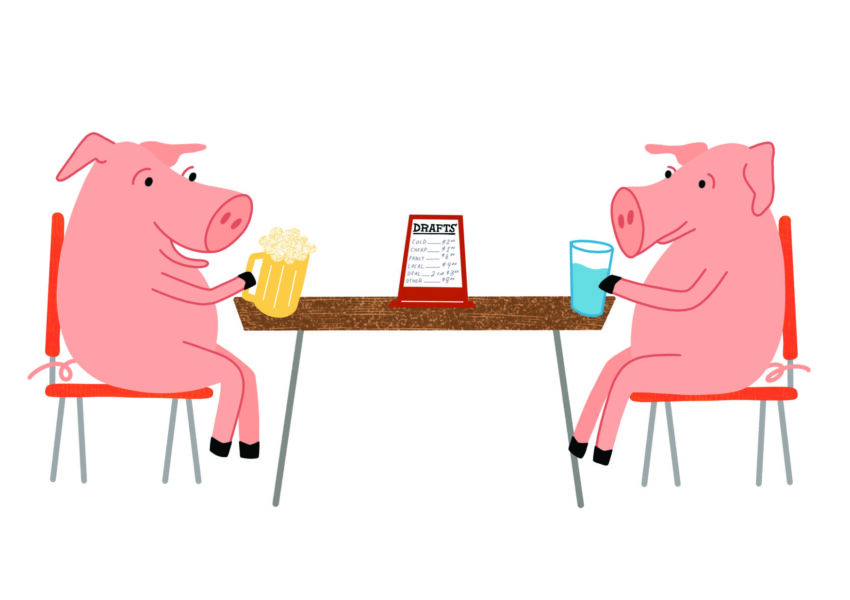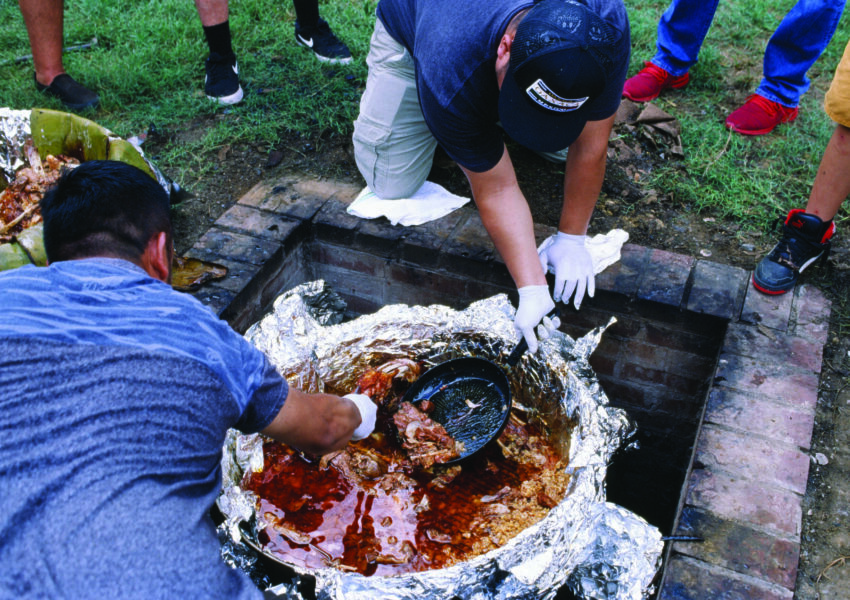A Curmudgeon Looks at Barbecue You could say I’m not delighted with everything that’s going on in the world of barbecue these days.
by John Shelton Reed
Illustrations by Molly Brooks
![]()
Who would have thought that there would someday be celebrity barbecue cooks with their own television shows, best-selling cookbooks, product lines, and James Beard Awards? Or that, in hundreds of barbecue competitions every year, thousands of participants would vie for millions of dollars in prize money? Or that new-style barbecue restaurants would be opening in cities across the country, some with white tablecloths and wine lists?
These days the internet seethes with a blooming, buzzing proliferation of barbecue blogs, newsletters, and webcasts (AmazingRibs.com has 32 million page views and 12 million visitors a year). There are barbecue programs on the Food Network, TLC, Destination America, PBS, Netflix, and who knows where else. Texas Monthly and Southern Living now have barbecue editors.
You could say that barbecue is hot these days. (Sorry.)
Perhaps that’s a good thing, on balance, but a hidebound traditionalist like me can still find much to view with suspicion. Every silver lining has a cloud.
One cloud that comes with no silver lining at all is the steady disappearance of old-time vernacular restaurants and joints, places that cook the traditional barbecue of their locale (chopped whole hog in eastern North Carolina or ribs in Alabama, for instance) and not much else. The situation may be especially dire in the Carolinas, which once had hundreds of these places, many dating from the Golden Age of the 1950s or even before. Often they were institutions in their communities, places for the after-church crowd, the Rotary Club, and teenagers on dates. Most have closed now, hammered by competition from fast-food chains, and perhaps by the realization that there are easier ways to make a living. Some were closed by their founders, others didn’t make the transition to a second generation, and third-generation places are truly rare.
Maybe even more distressing than closures, however, are conversions to the smoke-free Dark Side. Again, the situation may be most disturbing in the Carolinas, where it’s a sad fact that a large majority of sometime and would-be “barbecue” places now rely entirely on electricity, or what Hank Hill calls “energy-efficient clean-burning propane” to produce mere slow-roasted pork with barbecue seasoning, what the Campaign for Real Barbecue calls “faux ’cue.”

Another trend to deprecate is the relentless grinding down of distinctive local styles. Thirty years ago I wrote that barbecue is the closest thing we have in this country to Europe’s wines and cheeses: drive a hundred miles, I said, and the barbecue changes. You could tell where you were by what barbecue you were served. But that has become a far less reliable indicator. For instance, one can’t help but notice the recent intrusion of Texas barbecue into places where it doesn’t belong—like North Carolina. I should say that if we Tar Heels have to succumb to an invader we could do a lot worse than Texas, but I liked it better when their barbecue was a clearly labeled exotic, not simply “barbecue.” In truth, I’d be happy if I had to go to Texas to get it.
You could say that barbecue is hot these days.
Even worse than possible Texas hegemony, though, is the metastasis of what I call the International House of Barbecue (IHOB)—restaurants, many of them branches of chains, that offer a mix-and-match assortment of meats and sauces, a mishmash of regional styles. This is fine for traditionless places like Seattle, or Asheville—or for Kansas City, where this hodgepodge is the tradition—but it should be outlawed in Raleigh, Memphis, and Austin. IHOB is also partly responsible for the spread of the Kansas City heresy that barbecue is about doctored-ketchup sauce, an insidious doctrine now making inroads in the Carolinas and even Texas. But it must share the blame for that with “competition barbecue.”
The rise of that sport, as some of its practitioners call it, is one of the most remarkable developments since the turn of the century, and competitions should get credit for introducing barbecue to many Americans, especially outside the South. Also to their credit, most competitions require competitors to cook with wood (although pellets of pressurized sawdust count). The cloud here is that, like IHOB restaurants, barbecue competitions contribute to the leveling of regional differences that should be cherished. More than half of the thousand or so competitions each year are “sanctioned” by the Kansas City Barbeque Society, which requires competitors to cook pork shoulders, pork ribs, beef brisket, and chicken—never mind that they may be cooking in North Carolina, where until recently chicken, brisket, and ribs could be barbecued, sure, but didn’t thereby become barbecue. And although the Society claims that all sauces are treated equally, somehow Kansas City–style sauces always win, and I’m pretty sure the Texas no-sauce tradition is a complete non-starter.
While I’m at it, a minor complaint is that competitions give undue weight to barbecue’s appearance. Although, to my mind, any weight is undue weight, you may disagree; but surely when someone can write online about choosing exactly the right sprigs of parsley to line the Styrofoam box presented to the judges, things have gotten out of hand. Yes, good looks get points—14% or so of the score in KCBS competitions, more in others—but as my buddy Vince Staten once said, my taste is mostly in my mouth.

More importantly, television coverage of competition barbecue has contributed to some unfortunate misconceptions. It doesn’t greatly matter that some of the big winners come on like trash-talking pro wrestlers, but it does matter that (like pro wrestlers) nearly all competition celebrities are white. That compounds a larger pattern of erasing barbecue’s roots in the Black community. As Adrian Miller, the editor of this issue, pointed out in a 2018 op-ed for The Kansas City Star, only one of the Barbecue Hall of Fame’s first twenty-seven inductees was African American, and he died in 1940. The Hall has taken steps to correct this situation, including putting Adrian on the nominating committee, but there is still work to be done.
Another recent development that might evoke a raised eyebrow is the efflorescence of aspirational barbecue restaurants where cooks are addressed, without irony, as “chef” and liquor sales may be a profit center as important as the barbecue itself. These places usually serve some form of what I call haute barbecue and others have called “elevated” barbecue. I think that label disrespects old-time barbecue, which, done right, requires just as much labor and skill, but whatever it’s called, this new stuff comes in various forms. Some of these places honor local traditions by trying to perfect them, a few are trying to create local traditions in places without them, many float free from any recognizable tradition—and the resulting barbecue can be good, very good, even worth the price. And, bless them, these places cook at least mostly with wood and they’re not in direct competition with the vernacular places I love, so I’m happy to see them flourish.
There is value in bearing witness to what is being lost.
But I must point out that they are undermining a democratic tradition that goes back to community barbecues in the eighteenth century and was largely continued by the old-time places. Until recently, most catered to all sorts and conditions of customers—lawyers, construction workers, teachers, plumbers, doctors, policemen, country plow-boys and urban cowboys, hippies and rednecks, Protestants, Catholics, and Jews, even (after 1970 or so) Black and white—but almost always with a strong blue-collar representation. That won’t be happening at places with $15 pulled-pork sandwiches and valet parking.
But (I hear you say) why don’t I stop whining? If I can’t celebrate the good things that are happening, why don’t I at least suggest some ways to resist the not-so-good ones? Well, pardner, I’ve done what I can. A few years back Dan Levine and I started the aforementioned Campaign for Real Barbecue (TrueCue.org), to honor and promote old-time restaurants that cook with wood and to encourage new ones. (I’m happy to say that we’re now operating in five Southeastern states and the District of Columbia. God bless Texas, which doesn’t need us.) And because I’ve come to believe that the preservation of traditional regional styles may be up to educated home cooks, I’ve written a cookbook which is intended to be a sort of primer on those styles and a guide to cooking them.
Anyway, I believe that there is some value in merely bearing witness to what is being lost. Call it whining if you want. In the world of barbecue, as in the world at large, the forces of change are mighty and they may be irresistible. But as the great Victorian jurist James Fitzjames Stephen once observed, although the flood may be up, and it may sweep away all in its path, there is no reason to sing hallelujah to the river gods.
John Shelton Reed’s contributions to barbecultural studies include Holy Smoke: The Big Book of North Carolina Barbecue; Barbecue: A Savor the South Cookbook; and On Barbecue, just published by the University of Tennessee Press. He lives in Chatham County, North Carolina.
SIGN UP FOR THE DIGEST TO RECEIVE GRAVY IN YOUR INBOX.




